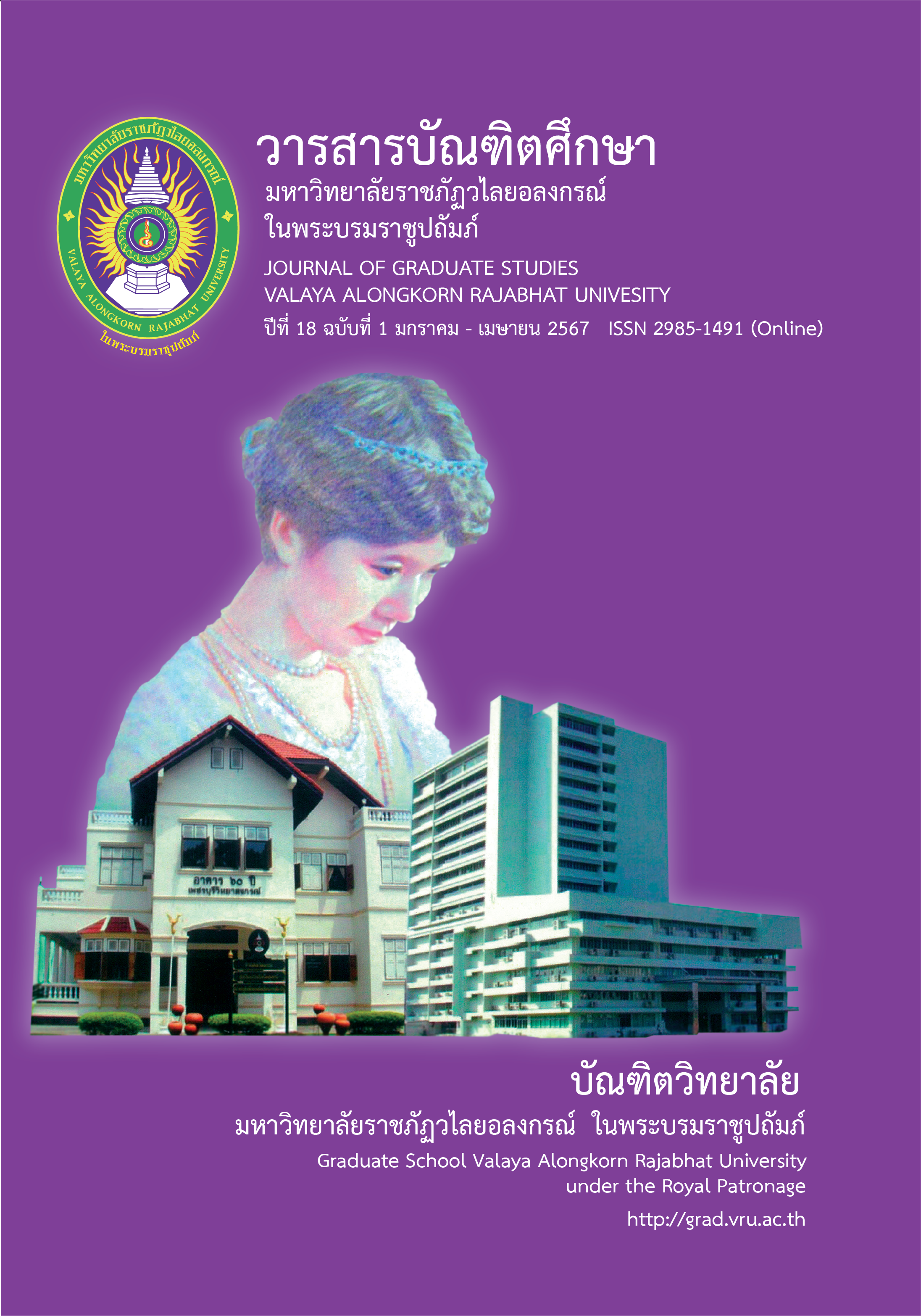THE STUDY OF EFFECTS OF CONSTRUCTIONISM LEARNING TO DEVERLOP SCIENCE PROCESS SKILL OF BASIC CHEMISTRY LABORATORY FOR MATHAYOM SUKSA 2
Main Article Content
Abstract
The purposes of this research were to 1) study the science process skills of basic chemistry laboratory, and 2) compare science process skills before and after using constructionism learning theory for mathayom suksa 2 students. The sample of this research were 25 students, who interested in choosing a course of basic chemistry laboratory in 1st semester, 2021, by purposive sampling. Research tools were 1) lesson plan using constructionism theory of basic chemistry laboratory, 2) multiple choice of integrated science process skills tests and created scoring rubric. The statistics used for data analysis were mean, standard deviation, percentage and t-test for dependent sample.
The results showed that 1) effects of science process skills after learning by using constructionism theory had the high level at overall 93.8%. The learners to develop science process skills had the highest improvements in 3 orders as follows: experimenting, model-based learning and identifying and controlling variable, respectively. And 2) the comparison of the science process skills of post-test were higher than those of pre-test differences at the statistically significant level of 0.01, the score post-test was higher than the score pre-test.
Article Details

This work is licensed under a Creative Commons Attribution-NonCommercial-NoDerivatives 4.0 International License.
บทความทุกเรื่องได้รับการตรวจความถูกต้องทางวิชาการโดยผู้ทรงคุณวุฒิ ทรรศนะและข้อคิดเห็นในบทความ Journal of Global of Perspectives in Humanities and Social Sciences (J-GPHSS) มิใช่เป็นทรรศนะและความคิดของผู้จัดทำจึงมิใช่ความรับผิดชอบของบัณฑิตวิทยาลัย มหาวิทยาลัยราชภัฏวไลยอลงกรณ์ ในพระบรมราชูปถัมภ์ กองบรรณาธิการไม่สงวนสิทธิ์การคัดลอก แต่ให้อ้างอิงแหล่งที่มา
References
Boonkiangwong, R., Athong, A. & Bongkotphet, T. (2018). Kānsưksā khwāmkhaočhai thammachāt khō̜ng witthayāsāt dōi chai konlawithī kānsō̜n bǣp kāntham nāi kān sangkēt læ kān ʻathibāi rư̄ang faifā læ mǣlek nakrīan chan matthayommasưksā pī thī hā [A Study of Understanding the Nature of Science by using teaching methods such as prediction, observation and explanation on electricity and magnetism Mathayom Suksa 5 students]. Teaching and learning development journal Rangsit University. 12(2), 82-92.
Chindanurak, T. (2016). Nawattakam læ sư̄ nai kānčhatkān rīan kānsō̜n witthayāsāt nai satawat thī yīsipʻet [Innovations and media in science teaching management in the 21st century]. Academic journal veridian e-journal. 9(1), 560-581.
Ducharoenpaisan, N., Panwilai, K., Ekapapaiboon, C. & Ruenbutr, N. (2016). Kānphatthanā bǣp fưk thaksa krabūankān thāng witthayāsāt khan phư̄nthān dōi chai bō̜ribot rư̄ang sathāna khō̜ng sān læ sānlalāi samrap nakrīan radap chan matthayommasưksā tō̜n ton [Developing a model for practicing basic scientific process skills using the context of the state of substances and solutions for lower secondary school students]. Srinakharinwivot Research and Development Journal (Humanities and Social Sciences). 8(15), 83-100.
Kongsiang, T. (2015). Kānphatthanā thaksa krabūankān thāng witthayāsāt dōi chai kitkamkān thotlō̜ng witthayāsāt sœ̄m kānrīanrū: kō̜ranī sưksā rōngrīan prāmōtwitthayā rāmʻintharā [Development of scientific process skills by using science experiment activities to enhance learning: a case study of Pramote Witthaya Ramintra School]. Master of Education Thesis, Rajamangala University of Technology Thanyaburi.
Padilla, M., Okey, J. & Dillashaw, F. (1983). The relationship between science process skills and formal thinking abilities. Journal of Research in Science Teaching. 20, 67-77.
Pirom. (2020). Phatthanākān sō̜n nai hō̜ng patibatkān thāng witthayāsāt hai thansamai læ mī prasitthiphāp [Developing teaching in scientific laboratories to be modern and effective]. Retrieved from https://il.mahidol.ac.th/th/i-Learning-linic/lecturer-and-learning-management-articles/
Suthi-art, K. (2018). Kānphatthanā rūpbǣp kān rīan kānsō̜n bǣp nēn prasopkān tām saphāp čhing phư̄a songsœ̄m khunnalaksana kān rīan dūai kānnam tonʻēng khō̜ng nakrīan chan matthayommasưksā tō̜n ton [The Development of an Experience-Based Teaching Model to Promote Self-Leaded Learning Characteristics of Lower Secondary School Students]. Doctor of Education Thesis, Dhurakij Pundit University.
Sitthichaiyakarn, S., Patphol, M., Wongyai, W. & Nooprick, C. (2016). kānphatthanā tūa bong chī khunnalaksana khwāmsāmāt nai kānčhatkān rīanrū būranākān thammachātwitthayāsāt [The development of ability to integrated nature of science in learning management indicators]. Journal of Graduate Studies Valaya Alongkorn Rajabhat University. 10(2), 129-142.
Teeka, C., Kitthavee, U., Jomtarak, R. & Makchuen, W. (2015). Phon khō̜ng kānčhat kitčhakam kānrīanrū dōi chai kān thotlō̜ng patibatkān thī mī panhā pen thān nai rāiwichā patibatkān fisik thūapai khō̜ng naksưksā chan pī thī nưng Khana Witthayāsāt læ Thēknōlōyī [The effect of learning activities using problematic practical experiments as a base in the general physics laboratory course of year students. No. 1 Faculty of Science and Technology]. In Kān prachum thāng wichākān khō̜ng mahāwitthayālai kasētsāt khrang thī hāsipsām [The 53rd Kasetsart University Academic Conference]. (pp. 258-265). Kasetsart University.


